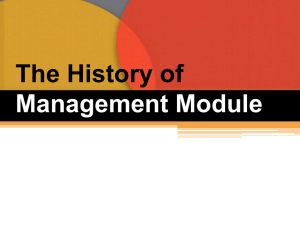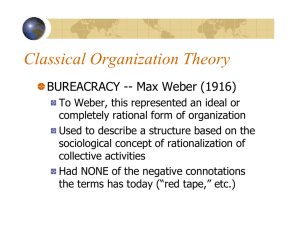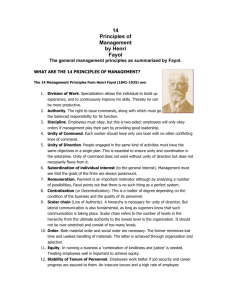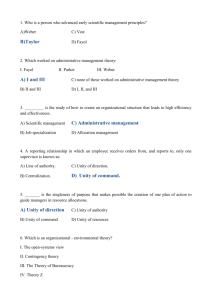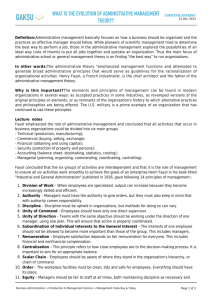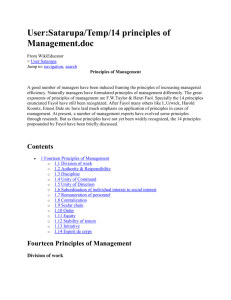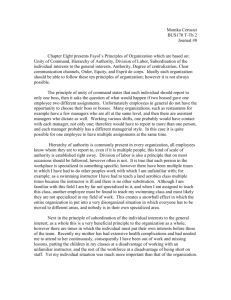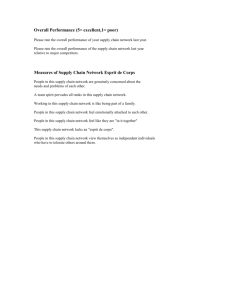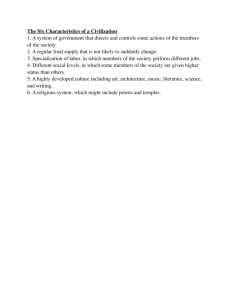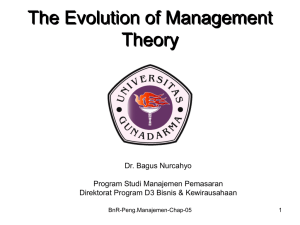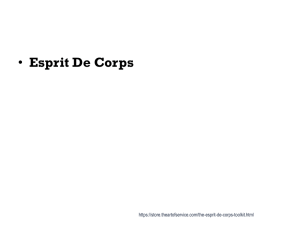Human resource management
advertisement
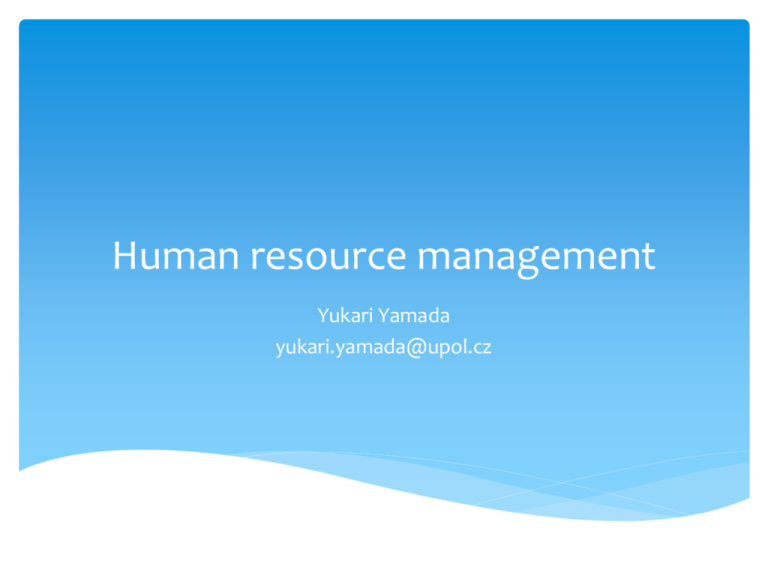
Human resource management Yukari Yamada yukari.yamada@upol.cz Human resource management How to make the best out of available human resources Objectives of this lecture To know concepts of four different management theories that clearly have influence on modern organizations To get an idea how to manage human resources in your own way Major management theories Frederick Taylor - Scientific Management Elton Mayo - Human Relations Movement Max Weber - Bureaucracy Henri Fayol - Administration Scientific management Frederick Taylor (1856-1915) A mechanical engineer and sought to improve industrial efficiency He believes that a group of ordinary men, following a scientific method, would perform better than the older "personally brilliant" captains of industry Wage has to be in concordance with the task. Bethlehem Steel works 600 workers use the same shovel for all materials He broke a job into its component parts and measure each to the hundredth of a minute by time and motion study He determined that the most effective load was 21½ lb, and found or designed shovels that for each material would scoop up that amount Significant improvement in productivity was seen reducing the workers needed to shovel from 500 to 140 To increase productivity, optimizing the way that tasks were performed and simplifying the jobs enough so that workers could be trained to perform their specialized sequence of motions in the one best way is needed. Principles of scientific management Replace rule of thumb work methods with methods based on a scientific study of the tasks Scientifically select, train, and develop each worker rather than passively leaving them to train themselves Cooperate with the workers to ensure that the scientifically developed methods are being followed Divide work nearly equally between managers and workers, so that the managers apply scientific management principles to planning the work and the workers actually perform the tasks. Taylor's influence Implications and criticisms While scientific management principles improved productivity and had a substantial impact on industry, they also increased the monotony of work. Skill variety, task identity, autonomy, and feedback were all missing ----innovation will not occur Human Relations Movement Elton Mayo (1880-1949) Social contacts a worker has at the workplace are very important He believed that workers could be motivated by acknowledging their social needs and making them feel important Hawthorne Studies Illumination studies(11.1924-4.1927) To see ways of improving productivity by changing lighting conditions in the workplace Physical environment didn’t have effect on productivity Relay assembly experiments(4.1927-5.1932) To see how changes in work environment impacted the group's and individuals' productivity Chose two women and asked them to choose four other workers to join the test group Together the women worked in a separate room where they had a supervisor who discussed changes in environment with them Hawthorne Studies Any changes usually increased productivity, even if it was just a change back to the original condition It was interpreted that the workers worked harder because they thought that they were being monitored individually Bank wiring room experiments(11.1931-5.1932) To see how payment incentives would affect productivity by introducing payment according to individual productivity Productivity decreased because the workers were afraid that the company would lower the base rate if overall productivity increases. The existence of informal groups or "cliques" within the groups were interpreted to have controlled their behaviors. Influence "group dynamics", "teamwork“, " organizational behaviors " and "social systems" all stem from Mayo's work in the mid-1920's Implications for management Employees should be given freedom to make decisions on their job Individual workers cannot be treated in isolation, but must be seen as members of a group. Informal or unofficial groups formed at work have a strong influence on the behavior of those workers in a group, therefore it should be treated seriously Where norms of cooperation and higher output were established because of a feeling of importance, physical conditions or financial incentives had little motivational value Managers must be aware of these 'social needs rather than work against it. Bureaucracy Order is the most important part Max Weber (1864-1920) Described many ideal types of public administration and government A classic, hierarchically organized civil service of the continental type is called "Weberian civil service" 6 characteristics Imperial positions Rule-governed decision making Professionalism Chain of command Defined responsibilities Bounded authority A stable, defined set of general rules for the employees that they must abide by at all times Influences and criticisms Many aspects of modern public administration go back to him Increasing rationalization traps individuals in the iron cage of bureaucratic, rule-based, rational control Ideas for development are hard to be generated Not flexible for unusual situations and changes Lack of an ability to make a decision on even a small thing among those in lower level ( inefficiency) Monopoly of power Ideal bureaucracy Hierarchical organization Delineated lines of authority in a fixed area of activity Action taken on the basis of and recorded in written rules Bureaucratic officials need expert training Rules are implemented by neutral officials Career advancement depends on technical qualifications judged by organization, not individuals So, how to manage people in practice Provide manual Less freedom Equal payment for equal job Remuneration of staff Stability of tenure Esprit de corps Order Specialization/division of labor Scalar chain/line of authority Centralization Unity of direction Unity of command Administration Henri Fayol (1841-1925) Management has five principle roles Forecasting and planning control Co-ordination Organization Commanding Principles of administration Specialization/division of labor Authority with responsibility Discipline Unity of command Unity of direction Subordination of individual interest to the general interest Remuneration of staff Centralization Scalar chain/line of authority Order Equity Stability of tenure Initiative Esprit de corps The final two principles, initiative and esprit de corps, show a difference Weber predicted a completely impersonal organization with little human level interaction between its members. Fayol clearly believed personal effort and team dynamics were part of a "ideal" organization. 1. Specialization/division of labor A principle of work allocation and specialization in order to concentrate activities to enable specialization of skills and understandings, more work focus and efficiency. 2. Authority with corresponding responsibility The R = A correspondence is important to understand. A manager should never be given authority without responsibility--and also should never be given responsibility without the associated authority to get the work done. 3. Discipline Discipline is essential for the smooth running of a business and without it standards, consistency of action, adherence to rules and values - no enterprise could prosper. 4. Unity of Command The idea is that an employee should receive instructions from one superior only. 6. Subordination of individual interest to the general interest One employee's interests or those of one group should not prevail over the organization as a whole. Who decides that the interests of the organization as a whole are? Ethical dilemmas and matters of corporate risk and the behavior of individual "chancers" are involved here. 7. Remuneration of staff The general principle is that levels of compensation should be "fair" and as far as possible afford satisfaction both to the staff and the firm 8. Centralization A natural consequence of organization 9. Scalar chain/line of authority The scalar chain of command of reporting relationships from top executive to the ordinary shop operative or driver needs to be sensible, clear and understood. Authority Flows from Top to Bottom Managing Director ↓ Marketing Manager ↓ Sales/ Media Manager ↓ Salesmen 11. Equity Equity, fairness and a sense of justice "should "pervade the organization - in principle and practice. 12. Stability of tenure Time is needed for the employee to adapt to his/her work and perform it effectively. Stability of tenure promotes loyalty to the organization, its purposes and values. 13. Initiative At all levels of the organizational structure, zeal, enthusiasm and energy are enabled by people having the scope for personal initiative. 14. Esprit de Corps Here, Fayol emphasizes the need for building and maintaining of harmony among the work force , team work and sound interpersonal relationships. Short test for health care management Who are health care managers? Describe the activity based accounting? Describe three parts of hospital organizations. Which management style would you prefer working as a member? Does it differ if you become a manager?
